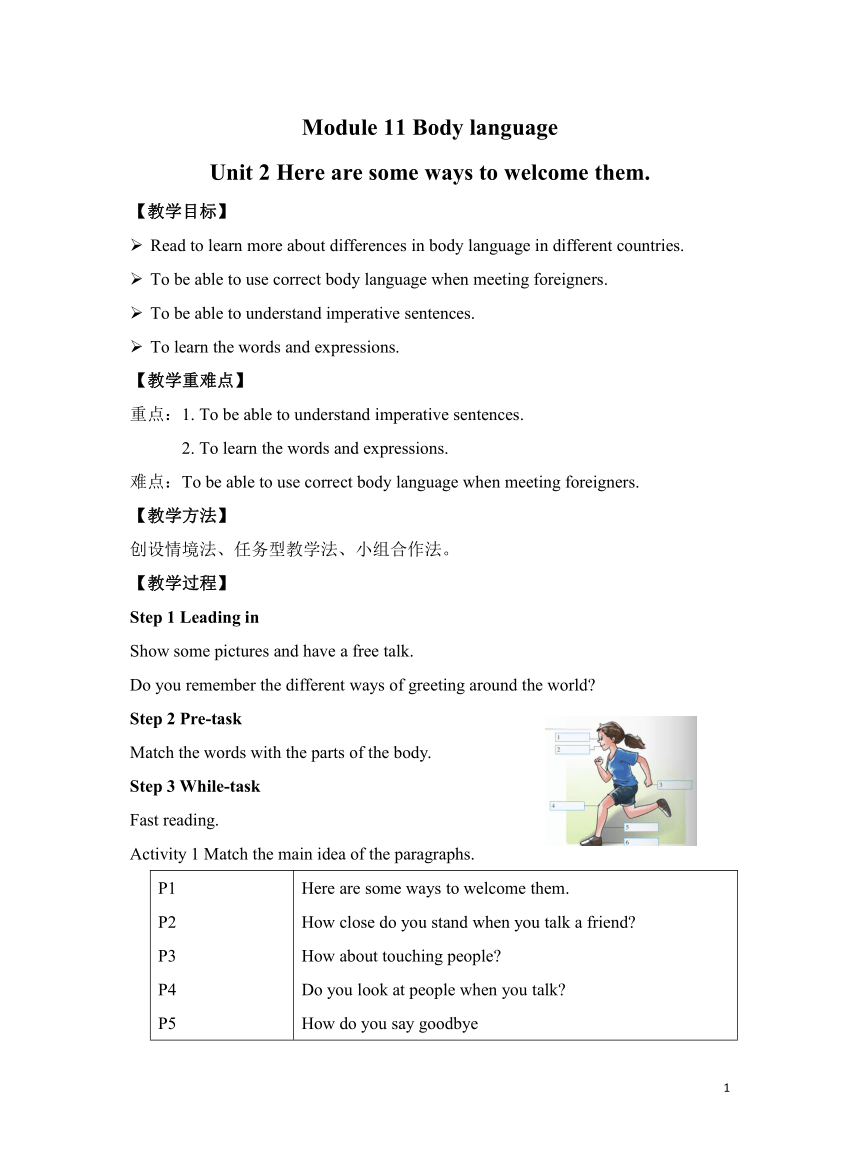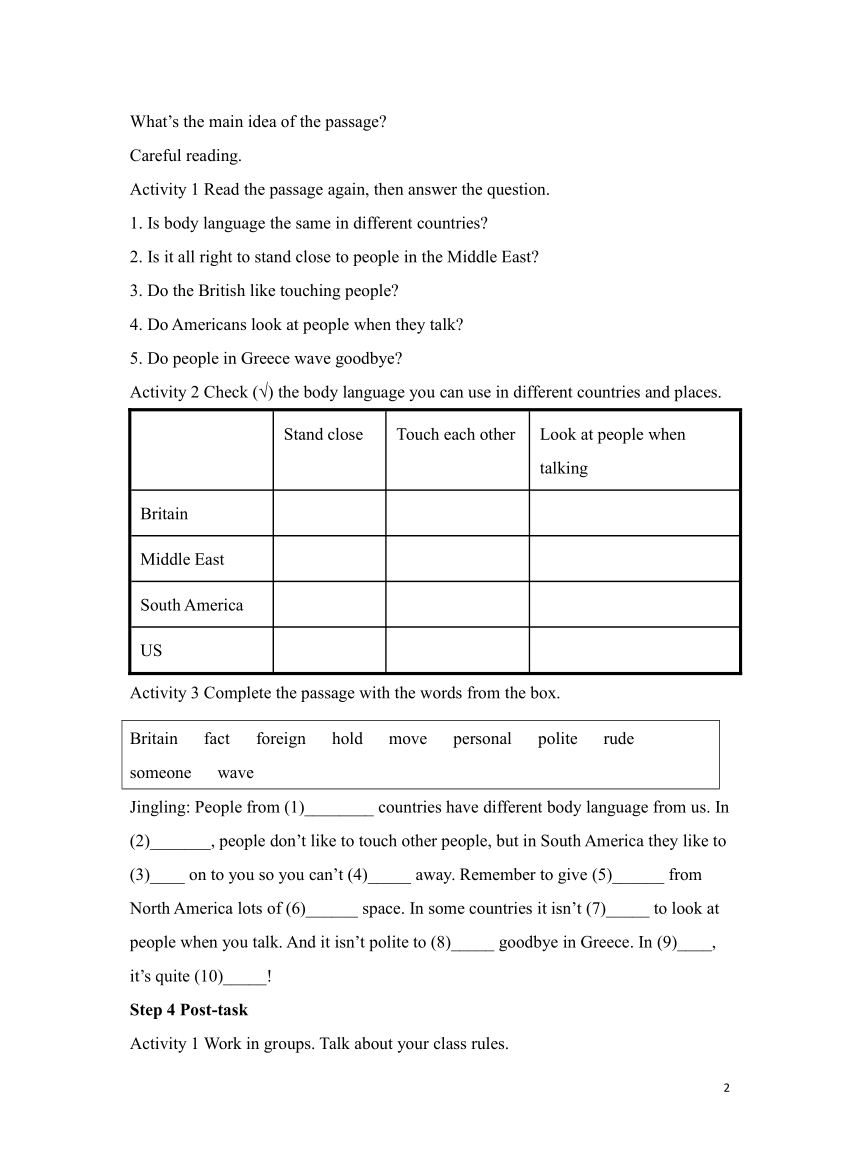初中英语外研版七下Module 11 Body language Unit2教案
文档属性
| 名称 | 初中英语外研版七下Module 11 Body language Unit2教案 |

|
|
| 格式 | doc | ||
| 文件大小 | 162.0KB | ||
| 资源类型 | 教案 | ||
| 版本资源 | 外研版 | ||
| 科目 | 英语 | ||
| 更新时间 | 2023-08-30 00:00:00 | ||
图片预览


文档简介
Module 11 Body language
Unit 2 Here are some ways to welcome them.
【教学目标】
Read to learn more about differences in body language in different countries.
To be able to use correct body language when meeting foreigners.
To be able to understand imperative sentences.
To learn the words and expressions.
【教学重难点】
重点:1. To be able to understand imperative sentences.
2. To learn the words and expressions.
难点:To be able to use correct body language when meeting foreigners.
【教学方法】
创设情境法、任务型教学法、小组合作法。
【教学过程】
Step 1 Leading in
Show some pictures and have a free talk.
Do you remember the different ways of greeting around the world
Step 2 Pre-task
Match the words with the parts of the body.
Step 3 While-task
Fast reading.
Activity 1 Match the main idea of the paragraphs.
P1P2P3P4P5 Here are some ways to welcome them.How close do you stand when you talk a friend How about touching people Do you look at people when you talk How do you say goodbye
What’s the main idea of the passage
Careful reading.
Activity 1 Read the passage again, then answer the question.
1. Is body language the same in different countries
2. Is it all right to stand close to people in the Middle East
3. Do the British like touching people
4. Do Americans look at people when they talk
5. Do people in Greece wave goodbye
Activity 2 Check (√) the body language you can use in different countries and places.
Stand close Touch each other Look at people when talking
Britain
Middle East
South America
US
Activity 3 Complete the passage with the words from the box.
Britain fact foreign hold move personal polite rude someone wave
Jingling: People from (1)________ countries have different body language from us. In (2)_______, people don’t like to touch other people, but in South America they like to (3)____ on to you so you can’t (4)_____ away. Remember to give (5)______ from North America lots of (6)______ space. In some countries it isn’t (7)_____ to look at people when you talk. And it isn’t polite to (8)_____ goodbye in Greece. In (9)____, it’s quite (10)_____!
Step 4 Post-task
Activity 1 Work in groups. Talk about your class rules.
— Shall we stand up when we answer a question in class
— Yes, we shall.
—What do you do when …
※ when the teacher comes into the classroom
※ when you want to ask a question during class
※ when you want to ask for a toilet break
※ …
e.g. — What do you do when you want to ask a question during class
— I always raise up my hand first.
Activity 2 Writing.
Make a list of class rules for new students in your school.
Stand up when you answer a question in class.
Don’t be late for class.
Be polite to the teacher.
Don’t eat food in class.
Activity 3 Exercises.
一、按照句子意思,填入恰当的词。
1. How many f________ languages can you speak
2. Your feelings about him are very __________ (person). We cannot trust your words.
3. I cannot find my glasses. I must put them __________ (某个地方).
4. We Chinese like to ______ (wave) to say goodbye.
5. When we arrived there, he was ________ (hold) a knife in his hand.
6. You should be ________ (有礼貌的) to the older.
7. I didn’t mean to be _______ (失礼的), but I had to leave early.
8. — Do you like the Japanese food
— ____________ (一点也不) .
9. They are very good friends. They always walk _____ (臂挽臂地) when they walk together.
10. You know what _____ (事实上), you are right. I need to give up the idea at once.
Step 5 Summary
1. We have learnt the words and expressions.
2. We have learnt how to use correct body language when meeting foreigners.
Step 6 Homework
1. Write a short passage about the body language in China. You can use the following questions to help you.
How do Chinese greet each other when they meet
How do Chinese say goodbye
…
2. Preview Language in use on P70-71.
【板书设计】
Unit 2 Here are some ways to welcome them.
Words and expressions:talk to / with sb. arm in armbe careful personal spacein fact move away Sentences:Remember to give someone from North America lots of personal space.It isn’t polite to look at people when you talk.
1
Unit 2 Here are some ways to welcome them.
【教学目标】
Read to learn more about differences in body language in different countries.
To be able to use correct body language when meeting foreigners.
To be able to understand imperative sentences.
To learn the words and expressions.
【教学重难点】
重点:1. To be able to understand imperative sentences.
2. To learn the words and expressions.
难点:To be able to use correct body language when meeting foreigners.
【教学方法】
创设情境法、任务型教学法、小组合作法。
【教学过程】
Step 1 Leading in
Show some pictures and have a free talk.
Do you remember the different ways of greeting around the world
Step 2 Pre-task
Match the words with the parts of the body.
Step 3 While-task
Fast reading.
Activity 1 Match the main idea of the paragraphs.
P1P2P3P4P5 Here are some ways to welcome them.How close do you stand when you talk a friend How about touching people Do you look at people when you talk How do you say goodbye
What’s the main idea of the passage
Careful reading.
Activity 1 Read the passage again, then answer the question.
1. Is body language the same in different countries
2. Is it all right to stand close to people in the Middle East
3. Do the British like touching people
4. Do Americans look at people when they talk
5. Do people in Greece wave goodbye
Activity 2 Check (√) the body language you can use in different countries and places.
Stand close Touch each other Look at people when talking
Britain
Middle East
South America
US
Activity 3 Complete the passage with the words from the box.
Britain fact foreign hold move personal polite rude someone wave
Jingling: People from (1)________ countries have different body language from us. In (2)_______, people don’t like to touch other people, but in South America they like to (3)____ on to you so you can’t (4)_____ away. Remember to give (5)______ from North America lots of (6)______ space. In some countries it isn’t (7)_____ to look at people when you talk. And it isn’t polite to (8)_____ goodbye in Greece. In (9)____, it’s quite (10)_____!
Step 4 Post-task
Activity 1 Work in groups. Talk about your class rules.
— Shall we stand up when we answer a question in class
— Yes, we shall.
—What do you do when …
※ when the teacher comes into the classroom
※ when you want to ask a question during class
※ when you want to ask for a toilet break
※ …
e.g. — What do you do when you want to ask a question during class
— I always raise up my hand first.
Activity 2 Writing.
Make a list of class rules for new students in your school.
Stand up when you answer a question in class.
Don’t be late for class.
Be polite to the teacher.
Don’t eat food in class.
Activity 3 Exercises.
一、按照句子意思,填入恰当的词。
1. How many f________ languages can you speak
2. Your feelings about him are very __________ (person). We cannot trust your words.
3. I cannot find my glasses. I must put them __________ (某个地方).
4. We Chinese like to ______ (wave) to say goodbye.
5. When we arrived there, he was ________ (hold) a knife in his hand.
6. You should be ________ (有礼貌的) to the older.
7. I didn’t mean to be _______ (失礼的), but I had to leave early.
8. — Do you like the Japanese food
— ____________ (一点也不) .
9. They are very good friends. They always walk _____ (臂挽臂地) when they walk together.
10. You know what _____ (事实上), you are right. I need to give up the idea at once.
Step 5 Summary
1. We have learnt the words and expressions.
2. We have learnt how to use correct body language when meeting foreigners.
Step 6 Homework
1. Write a short passage about the body language in China. You can use the following questions to help you.
How do Chinese greet each other when they meet
How do Chinese say goodbye
…
2. Preview Language in use on P70-71.
【板书设计】
Unit 2 Here are some ways to welcome them.
Words and expressions:talk to / with sb. arm in armbe careful personal spacein fact move away Sentences:Remember to give someone from North America lots of personal space.It isn’t polite to look at people when you talk.
1
同课章节目录
- Module 1 Lost and found
- Unit 1 Whose bag is this?
- Unit 2 Are they yours?
- Unit 3 Language in use
- Module 2 What can you do ?
- Unit 1 I can play the piano
- Unit 2 I can run really fast
- Unit 3 Language in use
- Module 3 Making plans
- Unit 1 What are you going to do at the weekends?
- Unit 2 We're going to cheer the players.
- Unit 3 Language in use
- Module 4 Life in the future
- Unit 1 Everyone will study at home
- Unit 2 Every family will have a small plane.
- Unit 3 Language in use
- Module 5 Shopping
- Unit 1 What can I do for you?
- Unit 2 You can buy everything on the Internet
- Unit 3 Language in use
- Module 6 Around town
- Unit 1 Could you tell me how to get to the Nationa
- Unit 2 The London Eye is on your right.
- Unit 3 Language in use
- Revision module A
- Module 7 My past life
- Unit 1 I was born in a small village.
- Unit 2 I was born in Quincy.
- Unit 3 Language in use
- Module 8 Story time
- Unit 1 Once upon a time….
- Unit 2 Goldilocks hurried out of the house.
- Unit 3 Language in use
- Module 9 Life history
- Unit 1 He left school and began work at the age of
- Unit 2 He decided to be an actor.
- Unit 3 Language in use
- Module 10 A holiday journey
- Unit 1 What did you do?
- Unit 2 This morning we took a walk.
- Unit 3 Language in use
- Module 11 Body language
- Unit 1 They touch noses!
- Unit 2 Here are some ways to welcome them.
- Unit 3 Language in use
- Module 12 Western music
- Unit 1 It's so beautiful!
- Unit 2 Vienna is the centre of European classical
- Unit 3 Language in use
- Revision module B
